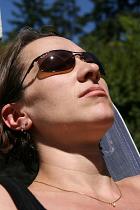Anti-Aging: Vitamin D boosts immunity
(NC) — We all know that vitamins are an important component of a healthy lifestyle. Vitamin D is no exception. It plays an important role in maintaining normal calcium and phosphorus levels, as well as bone and tooth health—so it protects against rickets, bone thinning and osteoporosis. But vitamin D's effects don't stop there.
According to Dr. Joyce Johnson, director of consumer education for Webber Naturals vitamins, "Vitamin D's health benefits include immune system support and recent studies are showing that this simple nutrient can also reduce risk for certain diseases and illnesses including colds and upper respiratory tract infections. Research has also indicated that there may be a link between increased vitamin D supplementation and reduced risk for cancer, particularly colorectal, breast and colon cancers".
Vitamin D is produced in the skin after exposure to ultraviolet rays from sunlight, which is why it is often called the “sunshine vitamin”. Most of the vitamin D we get is through exposure to sunlight. But how do we make sure we get enough vitamin D in the shorter winter days, though the clouds and smog, or even through sunscreen in the summer?
Vitamin D is available in small amounts in fatty fish, “fortified” beverages and egg yolks. Diet alone doesn't provide enough vitamin D, so most health providers recommend vitamin D supplementation. Vitamin D supplements such as those made in Canada by Webber Naturals, come in liquid, tablet, softgel and even chewable forms. Vitamin D is fat-soluble so should be taken with food.
The recommended dietary allowance, according to Health Canada, is 600 IU for people aged 1-70 and 800 IU for those 71 and older. However, many experts recommend higher doses if you are at risk for cancer or osteoporosis, up to 4000 IU/day for adults.
Vitamin D supplementation is especially important for the elderly because their vitamin D production abilities have declined. It is also important for people with limited sun exposure, people living in northern latitudes and people with darker complexions.
Comments
There are 0 comments on this post















